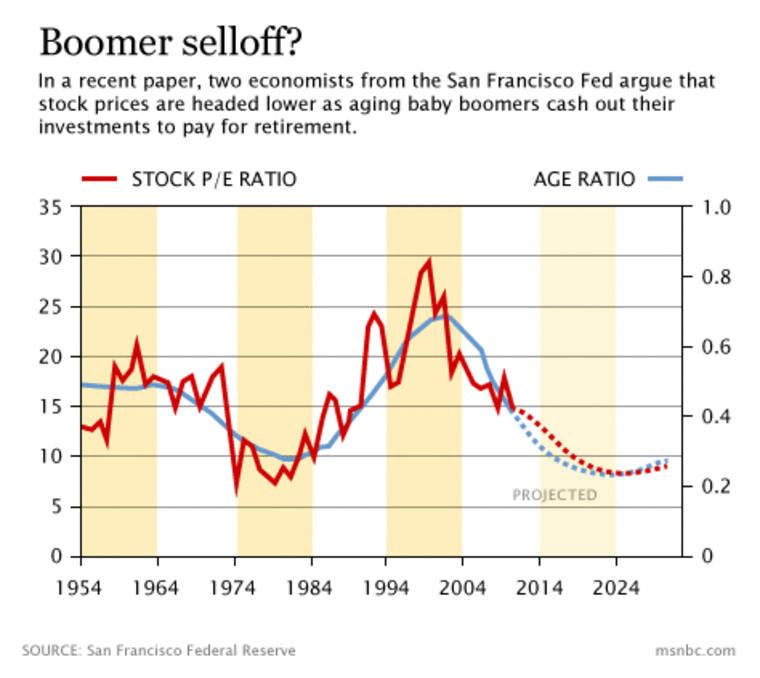If aging baby boomers dump their stocks when they retire, won’t that send the stock market lower? Investors have been pondering the question for years.
Now, two economists at the San Francisco Federal Reserve say they’ve found an equation that answers the question once and for all. If they’re right, stock prices are headed lower — for years.
Between 1947 and 1962, the U.S. population grew roughly twice as fast as it had in the two decades before the war. Soon dubbed the baby boom, this population bulge created a cottage industry for researchers studying the economic impact of this outsized “cohort.”
As boomer babies grew up to became adult consumers in the 1960s and 1970s, advertisers courted them. In the 1980s, as boomers began socking away money for retirement, the stock market boomed. As they settled down and raised families, they began buying houses, and then moved up to bigger ones, sparking a prolonged rise in house prices.
Economists have had some successes in forecasting the boomer generation’s impact before it was felt. In 1994, St. Louis Federal Reserve economist Peter Yoo presciently predicted a long-term rise in consumer spending as boomers entered their peak wage-earning years.
Fed economist Robert Martin found that the main driver of the 2000s housing boom was the “systematic and predictable changes in the working age population driven by the baby boom."
Now, as the front wave of boomers hits retirement age, their impact is shifting again. Politicians are wrestling with tough choices about how to meet the rapidly rising financial strains on Social Security and Medicare. Home prices are falling, in part because the rate of new household formations has dropped to historic lows.
So what happens to the stock market if baby boomers start cashing stocks out of their retirement accounts over a relatively short period? Won’t that send stock prices plummeting?
Despite numerous attempts, economists have been unable to agree on the answer to those questions. (As the old joke goes, you can line up 100 economists end to end, but you'll never reach a conclusion.)
In one widely cited paper, MIT economist James Poterba tackled the question and concluded that the data “do not show a sharp decline in asset demand between 2020 and 2050. This finding calls into question the 'asset market meltdown' view."
The answer?
In a paper published this week, San Francisco Fed economists Zheng Liu and Mark Spiegel decided to take another look. To answer the question, they compared the stock market’s price-to-earnings ratio, a widely used measure of demand for stocks, with the ratio of “middle-aged” people (age 40-49) to “old-age” people (aged 60-69). The theory is that if 40-somethings are typically buyers and 60-somethings are sellers, the ratio of those two age groups should have an impact on stock prices.
The results are striking. From 1954 to the present, the two ratios track closely. First, they fall together until about 1980, as the stock market endured the grinding, sideways decade of the Great Inflation. During that period, there were fewer 40-somethings of peak stock buying years compared to older investors who, presumably, were selling stocks to pay for retirement.
In 1980, the trend reversed sharply. The baby boomers were beginning to hit their 40s and accumulating stocks as the lower-birth-rate, Depression-era retirees were selling. As the ratio of boomers to retirees continued to rise, so did the stock market’s overall price-earnings ratio.
In 2000, stock prices famously peaked, and the market’s average price-earnings ratio began falling. So, too, did the ratio of 40-somethings to 60-somethings. Both have been falling steadily since.
If the two economists' equations are right, that trend will likely continue until 2021, when stock prices will be 13 percent lower than they were last year.
The authors are quick to point out that other forces will offset the downward pressure on stock prices from selling boomers. As the markets have gone global, demographic patterns in other countries will have a greater impact; wealth creation in emerging economies like China and India will produce demand for U.S. stocks from abroad.
Interest rate policies, which can vary widely over time, have a strong impact on the appeal of owning stocks. When the Federal Reserve pulls down rates on Treasury bonds, for example, investors typically go shopping for stocks to get a higher yield.
But all other things equal, there seems to be a clear link between stock prices and the ratio of 40-something buyers to 60-something sellers. At the moment, the ratio is not moving in the right direction for stock investors.
